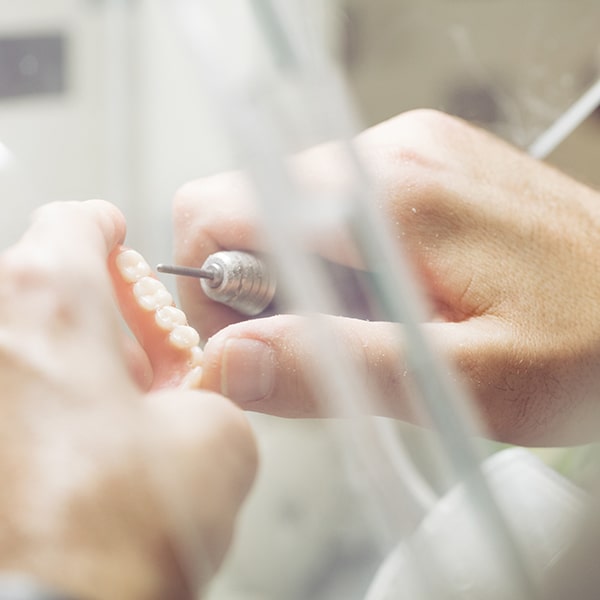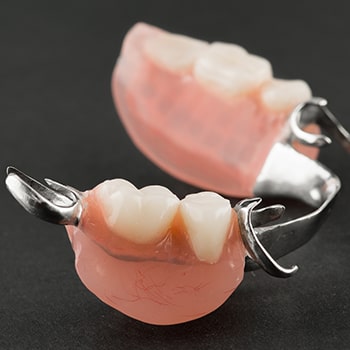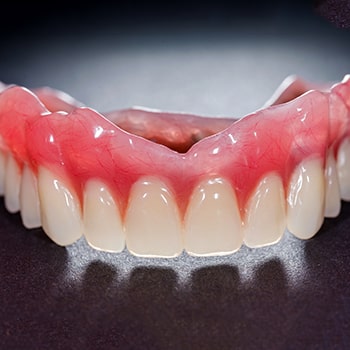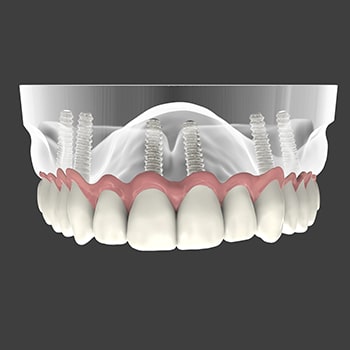BEST Dentures Near You In Stratford, CT
Restore Your Smile with Dentures, Partials & Implant Dentures Near Stratford, CT
Losing one tooth is devastating enough, but losing several or all of your teeth can greatly increase the risk factor for your physical comfort and dental health.
To solve this problem at the outset, Hawley Lane Dental proudly offers full and partial dentures to our Stratford-area patients. Our skill and professionalism in denture fabrication have made us the dentist of choice for individuals in Stratford, Trumbull, and Bridgeport.
Explore more:
What Are Dentures?
A denture is a removable prosthetic device designed to replace missing teeth and restore the function and aesthetics of the mouth. Dentures can either be complete (often referred to as full dentures) or partial, depending on the number of natural teeth remaining.
Complete or full dentures are custom-made for individuals who have lost all of their natural teeth, either due to aging, injury, or disease. These dentures cover the entire arch of the upper or lower jaw and help restore a full, natural smile. Partial dentures, on the other hand, are designed for patients who still have some natural teeth remaining. They are used to fill in gaps created by missing teeth, ensuring that the remaining teeth are supported and that the bite remains balanced.
Dentures are not only crucial for aesthetic purposes but also help restore functionality. They allow individuals to speak clearly, chew food properly, and smile with confidence. In addition to their cosmetic and functional benefits, dentures can also prevent other oral health issues, such as the shifting of remaining natural teeth. By filling in the gaps, dentures help maintain the structure of the face and jaw, which could otherwise change over time due to missing teeth.
These dental prostheses are available in various materials, including acrylic, porcelain, and flexible resins, each offering unique benefits. Acrylic dentures, for example, are often more affordable, while porcelain dentures provide a more natural, lifelike appearance. Dentists work with patients to choose the most suitable option based on comfort, durability, and aesthetic preferences. A dentist for seniors may also consider age-related oral health concerns when recommending denture materials and designs.
Proper care and maintenance are essential for the longevity of dentures. Regular cleaning, adjustments, and periodic checkups with the dentist ensure that the dentures continue to fit comfortably and function effectively. Dentures may require occasional adjustments to ensure a proper fit as the shape of the gums and jaw changes over time. It’s also essential to practice good oral hygiene, even with dentures, to prevent issues like gum irritation or infection.
While dentures are an excellent choice for many patients, some people often ask, “What does no one tell you about dental implants?” The truth is that implants not only replace missing teeth but also stimulate the jawbone to prevent bone loss, something dentures cannot do. This added benefit helps maintain facial structure and long-term oral health. For those seeking greater stability and a more permanent solution, implants can be an alternative or complement to dentures.
Overall, dentures provide an effective solution for those seeking to restore their smile and improve their oral health. Whether opting for full or partial dentures, the key to long-term satisfaction lies in proper fitting, care, and maintenance.
Partial dentures are worn to replace one or several (but not all) missing teeth. They are held in place with the help of the remaining teeth.
Partial dentures may be desired over dental bridges … Click to open this link in the same window … or implants … Click to open this link in the same window … for a number of reasons:
- Cost-effective – They are usually the least costly option compared to bridges or implants, and most insurance plans provide some coverage for them.
- Non-invasive – There is no drilling down teeth as with bridges or drilling into bone as with dental implants.
- Time – Some partial dentures may be fabricated fairly quickly depending on the type of material, location, and number of teeth being replaced and the close proximity of the dental lab.
Partial dentures can be designed in a number of materials, ensuring a custom choice for you:
- Metal-based partial dentures rely on a lab-cast metal framework. Acrylic/plastic and teeth are built up on the frame. They may have metal, tooth-colored, or clear clasps (hooks) that go around supporting teeth to hold them in place.
- Metal-free partial dentures are becoming more popular for aesthetic reasons. There is no metal framework. Rather, the denture is made completely of a plastic material with teeth built into it.
Full dentures become necessary if all the teeth are missing or need to be extracted. Traditionally, they are held in place through support from the bone, gums, and muscles of the mouth. Dentures may also be held in place by dental implants. … Click to open this link in the same window …
Full dentures consist of an acrylic base that covers the gums (and the roof of the mouth for an upper denture).
Teeth made of plastic or porcelain are embedded in acrylic. If you have a significant bone to support the denture, it can be very stable and function well for many years. However, it may change as you lose bone over time.
Wearing full dentures can lead to a number of problems. You may find yourself having one of these common complaints:
- Speech changes – Just as losing teeth can cause a change in the way you speak, dentures may also lead to a change.
- Loose – If you do not have enough bone to fully support the denture, they may move around when speaking and eating. Even if dentures seem tight at first, over time, they will loosen as you lose bone.
- Unable to eat – Certain foods may be difficult or impossible to chew with dentures. Because the teeth are made of plastic or porcelain, they do not shred and bite as natural teeth do. Fibrous, chewy, sticky, and tough foods are all hard to chew with dentures. If a denture is loose, it makes it even more difficult to eat. Because upper dentures cover the roof of your mouth, you can also notice changes in your ability to taste foods.
- Sores – Dentures can rub and pinch gums, leading to sores. If food becomes stuck under the denture, it can lead to sores as well.
An overdenture is a denture that is secured or stabilized by implants. If you have enough bone, implants may be placed in the jawbone to allow the denture to “snap” into place.
Two to four implants are usually needed to stabilize your denture, although many more may be placed if you have enough space. Small anchors, called abutments, attach to the implants and sit above the gums.
Inside your denture sits small rings that fit over the abutments. The dentures snap or lock into place and are much more secure than with denture adhesive.
Depending on the number of implants, your denture may be permanently secured to the implants as well. An overdenture is beneficial in a number of ways:
- Stability – Because the denture securely attaches to the implants, there is no risk of it slipping when eating or speaking. There is also no need for adhesive.
- Comfort – Since the denture is moving around less, there is less chance of irritations.
- Eating – When the denture is stable, less food becomes stuck under the denture, and there is less irritation. You may also eat firmer foods without worrying about your denture slipping.
- Durable – Because the implants are placed into the bone, they stimulate the bone to stay stable. Bone loss, which was discussed as a problem with tooth loss, does not usually occur with healthy implants. The denture may last longer since it may not need to be refit.
The cost of partial dentures in Connecticut ranges from $2,000 to $4,000, while the cost of dentures or mouth replacements for all missing teeth can range between $4,000 and $8,000.
The average cost of dentures with extractions is greater, and all costs are dependent on how many teeth need to be replaced and the complexity of the oral health issues.
Dentures are a more affordable option for replacing missing teeth than dental implants. Dental implants are standalone replacements, while implant-supported dentures use implants for a more stable fit. However, the denture itself is still removable.
-
Impressions – Molds are made of the shape and size of your mouth. Impression material is placed inside a tray and pressed into your gums to get an imprint of the tissue. A model is made from this impression. The denture will be made on this model.
-
Frame try-in – If a metal-based partial denture is being made, the frame or base is tried in to ensure a fit. It may be accompanied by a bite registration.
-
Bite registration – Wax is placed inside the mouth to determine how the jaws it together. Teeth are also picked out and mouth landmarks are noted for the lab.
-
Wax try-in – The teeth that were selected at your last visit are set up in place and held in with wax. These wax-based dentures are tried so you can see what your finished smile will look like. It also allows us to see if any changes need to be made to the fit or position of the teeth.
-
Final fitting – The finished denture is tried. We adjust any immediate pressure points and fine-tune the bite and fit. We review instructions for wearing and caring for your new dentures.
-
Adjustments – As you settle into using your new dentures, you may notice some irritations or sore spots appearing. You may come in for a visit immediately so that we can relieve the denture where it is bothering you.


Here are some important information for when you get dentures:
Try not to be discouraged with new dentures. Over time, you should adjust to speaking and eating with your new teeth. Practice makes perfect!
How to Care for Dentures: a Dentist’s Guide
Essential tips for maintaining the lifespan and performance of your dentures.
Dentures should be cared for like teeth in that you need to ensure they are free of food and debris:
After eating, make sure food is not lodged under your denture or around your natural teeth (with partial dentures). This can lead to soreness, odors, or cavities on natural teeth. You may need to remove your denture and clean it and your mouth after eating.
Dentures should be cleaned morning and night, just as you would do with your natural teeth. Remove the denture from your mouth and use a denture brush to clean any food or plaque off the denture. You may brush any natural teeth you have with the denture out of your mouth.
If you have no teeth, you may clean your gums with a brush or washcloth.
Dentures may be soaked in over-the-counter denture cleaner to deodorize daily or weekly as needed.
Never use any toothpaste or toothbrush to clean your dentures; they are abrasive and may create deposits or microscopic scratches that allow bacteria to grow. Only use soft brushes made for dentures. We will give you one with your new denture!
Never soak your denture in mouthwash or bleach. The denture may change colors, or the ingredients may damage the denture material.
Always take your dentures out to sleep to give your mouth a rest and allow it to “breathe.” Leaving dentures in overnight or too long can lead to an overgrowth of yeast or fungus, called “denture stomatitis.”
Finally, be sure to have a denture checkup annually. Even if you do not feel there may be a problem, we can see if any potential for trouble exists.
If you have an overdenture, we may clean your implants at your visit and check that the parts in your denture are in working order. Continuing your dental visits also allows us to continually screen for oral cancer … Click to open this link in the same window … and determine if a new denture is needed. Dentures usually need to be remade every 7-10 years due to wear and tear and also because of the changes that occur in the mouth. A reline may be needed sooner if the denture loosens, such as with weight loss.
We have created a helpful infographic giving you five tips and tricks for wearing dentures.
The loss of one or all teeth can be an event that has many repercussions for years. Losing your teeth can lead to any of the following changes:
-
Esthetics – Obviously, losing a front tooth or a tooth that is visible when smiling changes the esthetics of your smile. Depending on which teeth are lost, it can lead to a change in the appearance of your facial features. Cheeks can look sunken in, corners of the mouth can sag or the lips may look less full.
-
Confidence – When your face or smile is affected by losing teeth, self-confidence can be affected. You may find yourself smiling less, or avoiding social situations.
-
Function – Being able to chew food properly is essential for nourishment. Speech can also be affected. Certain sounds or words may be harder to say.
-
Stress – Losing one or many teeth places stress on the remaining teeth to absorb the forces when speaking and eating. This can lead to accelerated wear, cracking, drifting, or loosening teeth.
-
Bite changes – When you are missing teeth, the remaining teeth can drift and move, leading to a change in your bite. This again leads to the problems mentioned above.
-
Bone loss – The force teeth place on the jawbone is what stimulates the bone. When you are missing teeth, there is no stimulation of the bone. Over time, the bone is resorbed and gets lower and thinner.
Contact Hawley Lane Dental Today for Top-Rated Dentures Near Stratford, Connecticut
Patients who have visited Hawley Lane Dental concur that our practice is the top choice for superior dental care near Stratford, CT, area. We offer a comprehensive range of dental services; whether you’re in need of routine check-ups, cosmetic enhancements, pediatric care for your little ones, or emergency dental assistance, our team is dedicated to providing exceptional care tailored to your needs. For those considering alternatives to dentures, we can discuss dental implant cost in Connecticut and help you find the best solution. Contact us today to schedule an appointment and experience the difference!
-
Monday - 9:00am–5:00pm
-
Tuesday - 8:00am–5:00pm
-
Wednesday - 8:00am–5:00pm
-
Thursday - 8:00am–5:00pm
-
Friday - 8:00am–5:00pm






